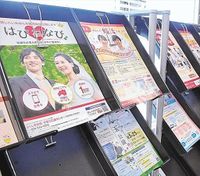In a world where the traditional notion of marriage is being challenged, Japan is witnessing a significant cultural shift regarding relationships and family structures. The concept of "romantic love ideology," which suggests that love should be the foundation for marriage, has been prevalent since its emergence in 19th-century Europe. This ideology has become a standard belief in many countries, including Japan, where recent surveys reveal intriguing insights into people's views on love and marriage.
According to a survey conducted by Resonator, a community site for married individuals, a considerable 36.2% of respondents believe that "love marriage is good for marriage," while an additional 30.9% feel that "love marriage is better if anything." This indicates that a total of 67.1% of people still favor the idea of love marriages, despite the current narrative suggesting that younger generations are becoming increasingly detached from romantic relationships.
The survey also highlighted stark regional differences in attitudes towards love marriages across Japan's prefectures. For instance, Ishikawa Prefecture reported a high percentage of individuals who strongly believe in the value of love marriages, reflecting a more conservative yet warm cultural attitude towards relationships. Conversely, Aomori Prefecture showed a significant number of respondents who felt that "it doesn’t have to be a love marriage," indicating a more relaxed approach to the institution of marriage.
This survey was part of a larger investigation into the state of romantic feelings and marriage in Japan, conducted from December 19, 2024, to February 14, 2025, involving 4,000 men and women aged 20 to 59. The findings suggest that while traditional views on marriage remain strong, there are emerging trends that indicate a shift in societal norms.
In the realm of popular culture, themes of unconventional relationships are also being explored. TBS's drama series "Three-Person Husband and Wife" has sparked discussions about non-traditional family structures. The show, starring Asaka Kodai, Akira Asakura, and Taiga Suzuki, revolves around a man, his ex-girlfriend, and her current boyfriend who attempt to navigate life as a de facto married trio. This narrative challenges traditional marriage concepts and raises questions about the dynamics of love and partnership in a diverse society.
The drama addresses real-life issues such as household responsibilities, parental acceptance, and the complexities of jealousy, all while portraying a unique take on marriage that deviates from the conventional two-person model. Legal expert Takashi Kunimatsu discussed the implications of such relationships, noting that Japanese law currently does not recognize marriages involving three people. Instead, they must navigate the complexities of de facto marriage, which lacks a standardized form or legal framework.
Kunimatsu explained that while de facto marriages are not formally recognized, they can be established through mutual agreements and contracts, which serve to outline the rights and responsibilities of each party involved. As more individuals choose this path, the importance of legal documentation, such as notarized deeds, becomes increasingly apparent. These documents can provide proof of the relationship and are essential in situations where legal recognition is necessary.
Despite the growing interest in de facto marriages, the current legal structure presents significant challenges. The cost of creating a notarized deed with a lawyer can range from 100,000 to 200,000 yen, and the process can be complicated, especially for non-traditional arrangements like a three-person marriage. This raises questions about the accessibility of legal resources for those seeking to formalize their relationships.
Meanwhile, Japan's birth rate continues to decline, exacerbating concerns about the future of family structures in the country. The Ministry of Health, Labor and Welfare announced in February 2025 that the number of births in 2024 hit an all-time low, with a birth rate of just 1.20. This decline is occurring at a pace 15 years faster than anticipated, prompting a closer examination of the societal factors contributing to this trend.
In contrast, South Korea, which shares similar socio-cultural dynamics with Japan, reported a slight increase in its birth rate from 0.72 to 0.76 in 2024, marking the first rise in nine years. This increase has been attributed to various factors, including the postponement of childbirth during the COVID-19 pandemic. Female politicians in South Korea have indicated that the intense competition in education and societal expectations regarding marriage are significant contributors to the declining birth rate in both countries.
Ok Joo-ryun, a member of the Presidential Committee on Aging Society and Population Policy, highlighted that South Korea's educational system fosters a zero-sum mentality, where individuals are constantly competing against one another. This competitive atmosphere can discourage young people from pursuing relationships and starting families. Lee Hye-won, a Seoul Metropolitan Council member, noted that many South Korean students retake entrance exams to erase the name of the university they initially attended, reflecting a societal obsession with academic prestige.
In response to the declining birth rates, local governments in Japan, such as Fukushima Prefecture, have initiated various measures to support marriage and family formation. These include organizing matchmaking events and volunteer programs aimed at facilitating connections among singles. However, despite these efforts, the number of marriages and births in Fukushima has continued to decline, prompting officials to reassess the effectiveness of their strategies.
Yuasa Shuhei, a representative from the Children and Youth Policy Division, expressed the need for diverse matchmaking opportunities for young people, emphasizing that the focus should not solely be on traditional male-female pairings. In some cases, the emphasis on matchmaking has deterred participation, leading to a reevaluation of how these events are marketed and structured.
As Japan navigates these complex social dynamics, the interplay between love, marriage, and family will likely continue to evolve. The rise of de facto marriages and the exploration of non-traditional relationships in media reflect a broader cultural shift that challenges long-standing norms and prompts society to reconsider what constitutes a family.





